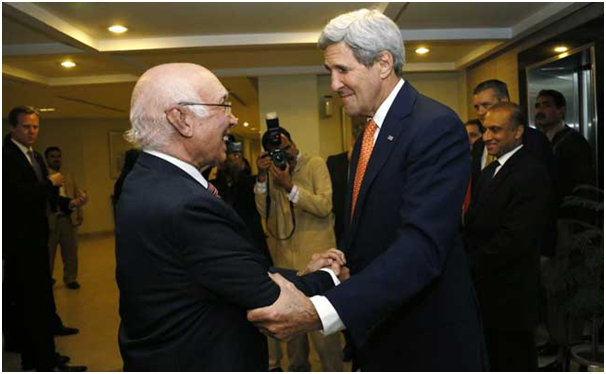U.S-Pakistan Introduce Kashmir in New Strategic Relations

NEW DELHI: Kashmir has been introduced in the institutionalised annual Strategic Dialogue between the United States and Pakistan for the first time, in a move that should be ringing alarm bells in New Delhi.
This comes after the visible US push for India and Pakistan to resume the dialogue as reported in The Citizen recently.
It follows the tone set in a joint statement issued after the meeting between US President Barack Obama and Pakistan PM Nawaz Sharif in Washington last October.
The US-Pakistan joint statement issued in Washington on Tuesday clearly states, “The United States and Pakistan emphasized the importance of meaningful dialogue in support of peaceful resolution of outstanding issues, including Kashmir. The delegations underscored that all parties in the region should continuously act with maximum restraint and work collaboratively toward reducing tensions.”
In Parliament Congress leader Rahul Gandhi, in an unusually fiery and confident speech, accused Prime Minister Narendra Modi of overturning the diplomatic gains made by the UPA government in caging Pakistan in one small space. He said years of aggressive diplomacy after the Mumbai terror attack had succeeded in isolating Pakistan, but this was negated entirely by PM Modi’s one visit to Lahore to have tea with Pakistan PM Nawaz Sharif.
PM Modi did not respond to this during his address in the Lok Sabha on Thursday. But if Rahul Gandhi’s charge is now taken in the light of this joint statement, it does confirm a turnaround in US policy towards Pakistan and substantiates what former diplomat MK Bhadrakumar has written, “Pakistan has brilliantly succeeded in inserting the Kashmir issue into the agenda of its annual Strategic Dialogue with the US.”
A shift in US policy towards Pakistan has been visible since the end of last year when statements by US officials were more encouraging and even appreciative of Islamabad. The joint statement confirms this shift with the US commending Pakistan for the “constructive role” it has played in resolving the Afghan issue. And in a reference to the Pathankot attack it has crossed the Indian position by again praising Sharif for the detention of Jaish-e-Mohammad leader Maulana Masood Azhar as part of his “stated commitment to take prompt and decisive action on this investigation and to bring the perpetrators of the January 2, 2016 attack on the Pathankot airbase to justice.”
The inference here is clearly that the Indian position not to talk to Pakistan is not considered tenable, more so as in Washington’s view sufficient action has been taken by PM Sharif to prove his sincerity to the peace process.
After several years Pakistan has succeeded in convincing the US that it is serious about the war on terrorism, with clearly the Army Chief there, General Raheel Sharif playing a major role in this. The military operations against extremist groups in the northern areas have had an impact on this perception. Despite the periodic flirtation with India, successive governments in the US have always moved back to the stability of the old relationship with Pakistan. This time, however, Islamabad has extracted strategic praise and cooperation, legitimising the new relationship in the two day strategic dialogue between Secretary of State John Kerry and Pakistan Advisor Sartaj Aziz.
Pakistan had defined its strategic interests as in Kashmir and Afghanistan. Its diplomacy had been centred around extracting these from Washington, that had for the past several years been reluctant to alienate India on the two fronts. However, now under In fact a cahnge wherein Islamabad got its way on Kashmir, and on Afghanistan where it has been pressing for more autonomy and less Indian “interference.” The US had been unequivocal on the Afghan issue but now under a separate heading ‘Fostering Strategic Stability’ it has conceded what emerges as US-Pakistan-Afghanistan troika in strategic terms. In fact, recently these three countries along with China had a meeting of the Afghanistan issue. India was not invited.
Since the Mumbai terror attacks, India had managed to gain considerable strategic space on both Kashmir and Afghanistan. The US that would openly admit to a “push or a nudge” had fallen silent on india-Pakistan relations, limiting itself to the hope that these would improve but making it clear that this was for both to resolve directly. By introducing Kashmir and other issues, into the scope of its bilateral relations with Pakistan now, Washington has taken a step down the road leading to Islamabad without the necessary strategic detour to Delhi.
Interestingly, the pressure on India to concede ground on the military Logistics Agreement has broken ground with reports from Washington suggesting a possible signing of this controversial agreement when US Defence Secretary Ashton Carter visits New Delhi in April. Despite wanting to former Prime Minister Manmohan Singh, under pressure from the then Opposition and sections of his own Congress party, had been unable to proceed with this agreement that basically allows the US to use Indian military bases. Defence deals remain a priority for the US in its relationship with India.
Meanwhile, it is certain with Kashmir on the US-Pakistan strategic table, New Delhi is going to feel the heat.



